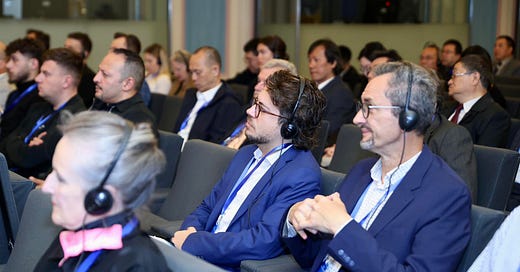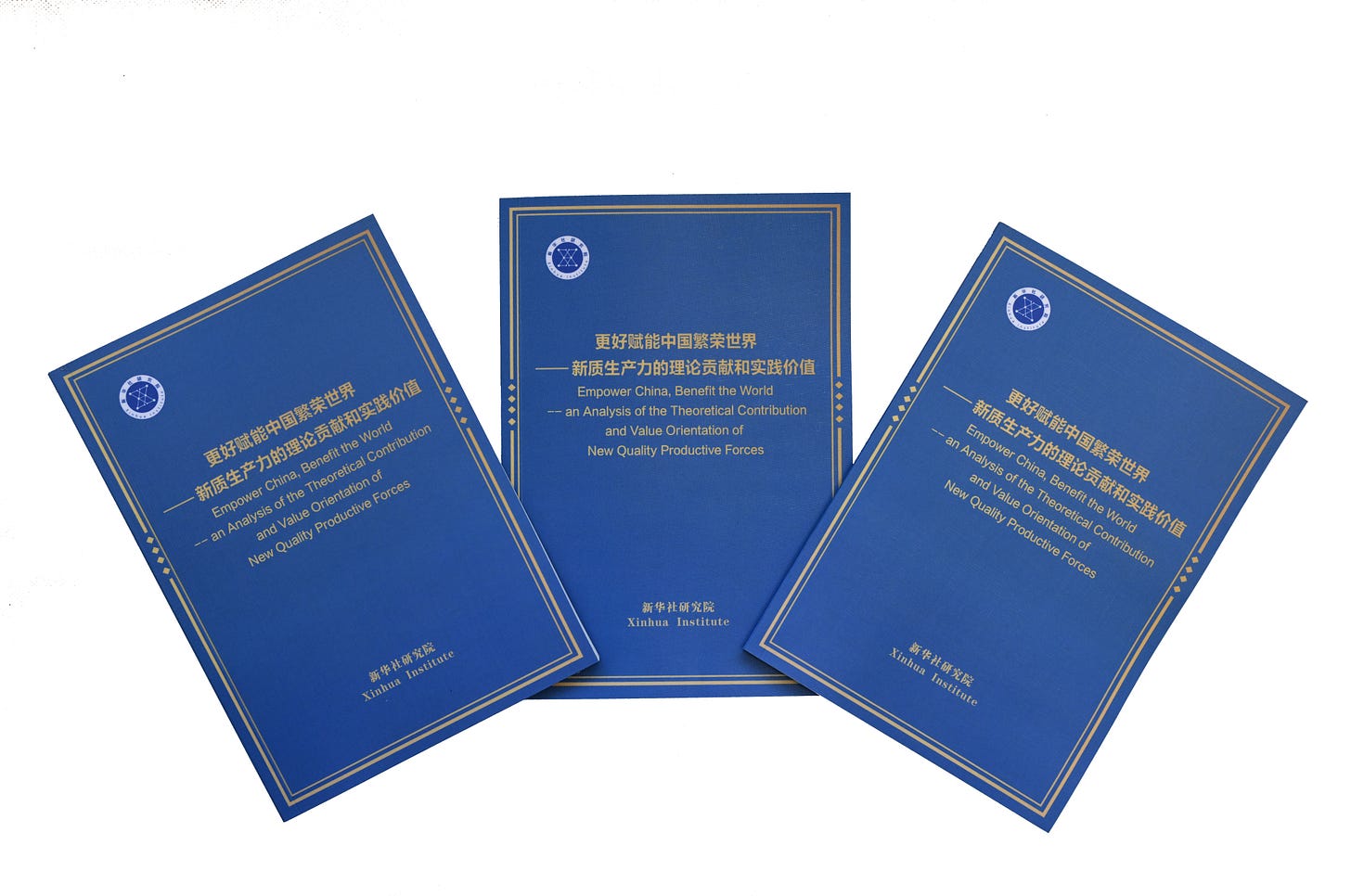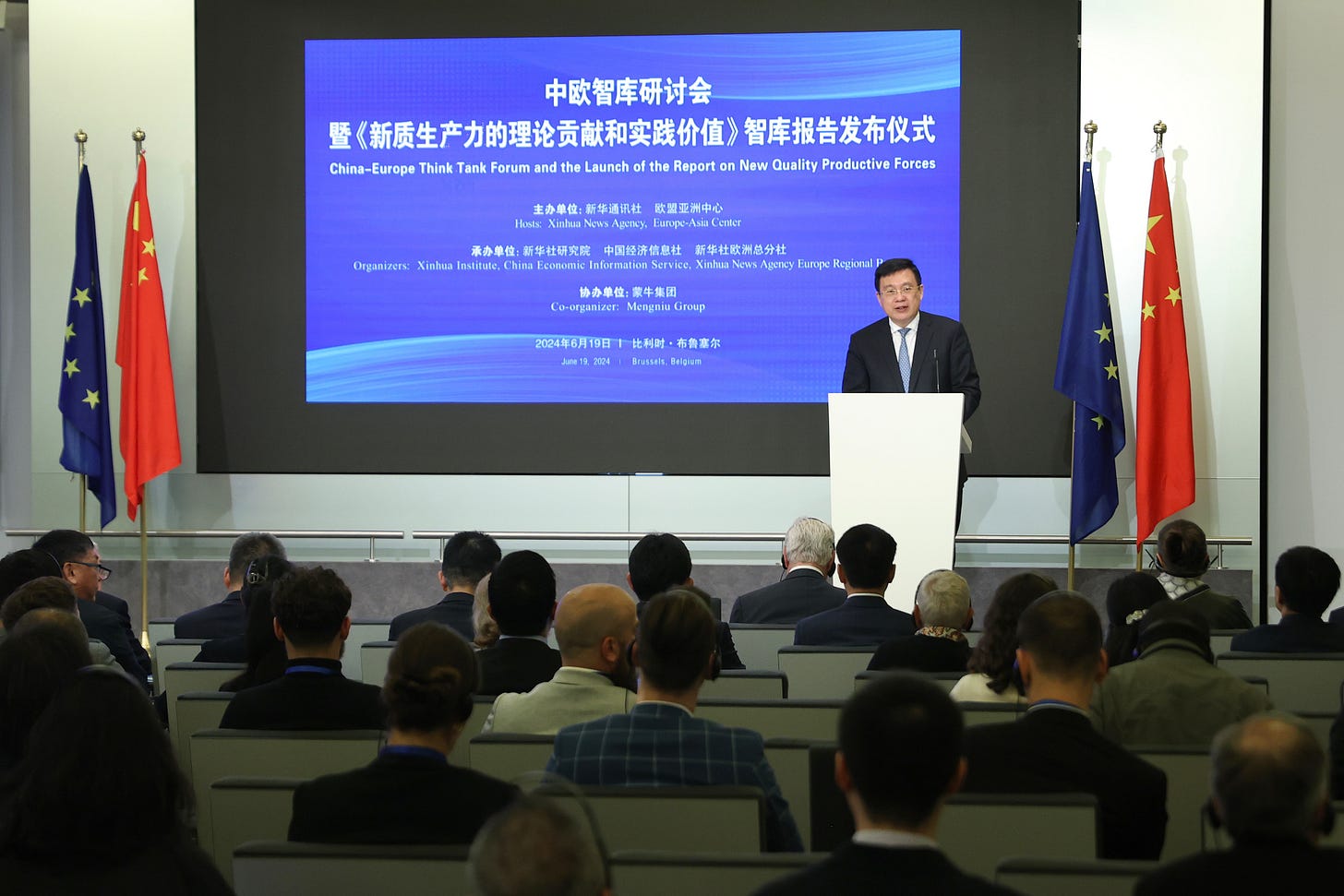Empower China, Benefit the World: Launch of the New Quality Productive Forces Report
Release of the Report and Forum Overview
On June 19th, we released the think tank report titled “Empower China, Benefit the World—an Analysis of the Theoretical Contribution and Value Orientation of New Quality Productive Forces” in Brussels, Belgium, and hosted a China-Europe think tank forum. “New Quality Productive Forces” became a hot topic among the participants.
Over 100 representatives from political, think tank, media, and business circles of China and Europe, as well as from international organizations, participated in the forum co-hosted by Xinhua and the Europe-Asia Center.
The report is divided into five chapters, closely following President Xi Jinping’s important expositions on developing new quality productive forces. Based on in-depth investigation and research, it systematically explains the rich connotation, core significance, practical path, and scientific methodology of new quality productive forces. Additionally, it showcases China’s vivid practices in developing new quality productive forces through 10 typical cases.
In 2023, Chinese President Xi Jinping introduced the concept of “new quality productive forces” during local inspections. This concept has since been systematically elaborated upon in various important meetings and sessions. New quality productive forces represent an innovation and development of Marxist productivity theory, enriching Xi Jinping’s economic thought and providing fundamental guidance for China to achieve high-quality development in the new era.
Summary of our Report
1. What are new quality productive forces?
New quality productive forces are advanced productive forces driven by innovation, characterized by:
• High technology: Technological breakthroughs drive progress.
• High efficiency: Significant improvement in total factor productivity.
• High quality: Aligns with the new development concept.
Its essence includes revolutionary technological breakthroughs, innovative configuration of production factors, and deep industrial transformation and upgrading. It involves optimizing the combination of labor, means of labor, and objects of labor to achieve a substantial leap in productivity.
2. Why develop new quality productive forces?
Developing new quality productive forces is essential for promoting high-quality development and has several critical aspects:
• Economic growth: Addresses the limitations of traditional productive forces dependent on factor inputs, transitioning the economy from quantitative expansion to qualitative improvement.
• Industrial upgrading: Facilitates structural adjustment and enhances the industrial and value chains.
• Green development: Promotes green and low-carbon transformation, achieving sustainable development.
• Global competitiveness: Enhances China’s competitiveness and influence in the global economy.
3. How to develop new quality productive forces?
The development of new quality productive forces involves several key strategies:
• Strengthening technological innovation: Focus on breakthroughs in key core technologies, especially original and disruptive innovations.
• Transforming traditional industries: Enhance traditional manufacturing through high-end, intelligent, and green upgrades.
• Cultivating emerging industries: Develop strategic emerging industries, such as new energy, new materials, and advanced manufacturing.
• Improving production relations: Deepen reforms to promote efficient coordination and matching of new quality productive forces factors, innovate the allocation of production factors, and improve the mechanism for factor participation in income distribution.
4. What is the impact of new quality productive forces on China and the world?
For China:
• Drives high-quality economic development, achieving technological self-reliance.
• Promotes industrial structure optimization and upgrading, enhancing global competitiveness.
• Facilitates comprehensive social progress, realizing the great rejuvenation of the Chinese nation.
For the world:
• Injects new momentum into global technological transformation and economic development.
• Supports global green and low-carbon transformation, aiding sustainable development.
• Fosters international economic cooperation, achieving win-win development.
More Detailed Contents
Chapter 1: Innovative Development of Marxist Theory on Productive Forces
Key Elements of New Quality Productive Forces:
1. Innovation-Driven: Sci-tech innovation, especially disruptive and original innovations, plays a crucial role.
2. Transformative Growth Model: Significant increases in total factor productivity by altering the relationship between inputs and outputs.
3. Industrial Application: Upgrading traditional industries and cultivating new and future industries through sci-tech innovations.
4. Green Development: Emphasizing sustainability and environmental friendliness, moving away from excessive resource dependence.
These new productive forces symbolize the development and progress of civilizations, driven by technological advancements like mobile Internet, big data, and artificial intelligence. They are crucial for Chinese modernization and the great rejuvenation of the Chinese nation, addressing both high-quality development and the aspirations for a better life.
Chapter II: Developing New Quality Productive Forces with Sci-Tech Innovation as Core Element
Strategies for Sci-Tech Innovation:
1. Focusing on Key Fields: Prioritizing breakthroughs in essential technologies to meet urgent needs and long-term demands.
2. Strengthening Basic Research: Achieving self-reliance in science and technology through zero-to-one innovations.
3. Empowering Businesses: Encouraging businesses to take the lead in tech innovation, supported by favorable policies and increased R&D investment.
4. Modernizing Industries: Transforming traditional industries and developing new industrial clusters in areas like AI, biotechnology, and green technology.
China aims to build a modern industrial system, driving structural upgrading and optimizing development models towards an advanced, intelligent, and green manufacturing sector.
Chapter III: Forging a New Type of Relations of Production Compatible with New Quality Productive Forces
Developing new quality productive forces requires comprehensive reforms to create compatible relations of production. President Xi pointed out that to develop new quality productive forces, it is imperative to deepen reform across the board to create a new type of relations of production that aligns with their development.
Core Elements of Reform:
1. Market-Based Allocation: Deepening reforms for efficient resource allocation and building a high-standard market system.
2. Improving Distribution Mechanisms: Enhancing policies for labor, capital, land, technology, and data distribution to unleash productive forces’ vitality.
3. Integrating Education, Science, and Talent: Strengthening the foundation for innovation through reforms in education, science, and talent management.
4. Expanding High-Level Opening Up: Creating a conducive international environment for developing new quality productive forces through continued integration and cooperation in global markets.
China’s commitment to high-level opening-up aims to leverage its vast market, attract global resources, and create a globally competitive innovation ecosystem.
Chapter IV: New Quality Productive Forces’ Significance to the World
Since the Industrial Revolution, only a few countries have modernized over the span of more than 200 years. The world’s modernization process is fraught with challenges, such as sluggish economic recovery, geopolitical tensions, and the trend of de-globalization.
China’s development of new quality productive forces is not only a proactive move towards the great rejuvenation of the Chinese nation but also a responsible effort to promote global peace, development, mutual benefit, and shared prosperity by sharing its own modernization practices.
Global Impact:
1. Expanding Consumer Market: Driving imports and sharing development opportunities with trading partners.
2. Enhancing Global Innovation: Attracting multinational investments in innovative technologies and services.
3. Improving Economic Governance: Leading in data management and digital economy regulations, driving transformation in global economic governance.
4. Promoting Sustainable Development: Emphasizing green development and ecological civilization, moving away from resource-dependent growth models.
5. Advancing Human Development: Sharing modernization fruits more equitably, promoting comprehensive human development and improving quality of life.
China’s efforts in developing new quality productive forces aim to serve people’s modernization, fostering creativity and civility in production and life, and enhancing global cooperation for sustained prosperity and harmonious coexistence.
Chapter V: Exploration and Practice of Developing New Quality Productive Forces Across Regions
Various regions have engaged in extensive exploration and practice in developing new quality productive forces, accumulating rich experiences. These practices not only contribute to the high-quality development of local economies but also provide valuable references for nationwide development. Local governments, by leveraging their unique advantages and innovating development paths, have formed diverse development models.
Highlights from the Forum
In a speech delivered at the meeting, Fu Hua, president of Xinhua News Agency and chairman of the academic committee of Xinhua Institute, said that the concept of "new quality productive forces" creatively put forward by Chinese President Xi Jinping was based on his insightful observation of the world's sci-tech and economic trends.
Fu said that the concept contributes greatly to international economic theories, deepens understanding of the laws of productivity development, and further answers a series of major issues concerning the development of the Chinese economy in the new era.
Developing new quality productive forces will not only propel the great ship of the Chinese economy to ride the wind and waves, and sail far and wide, but will also promote sharing of development dividends between China and other countries in the world, and make win-win cooperation more fruitful, so as to help build a better world that features peaceful development and prosperity for all, Fu said.
The report is the latest achievement of Xinhua Institute's research on this concept, Fu noted, adding that Xinhua News Agency will strengthen research and cooperation with think tanks from other countries and jointly provide suggestions and proposals on developing the world economy.
Fabrizio Hochschild, former under-secretary-general of the United Nations, said at the forum that the concept of new quality productive forces is beyond China's border.
Noting that China is the world's second-largest economy, the scale of its manufacturing industry ranks first in the world and it also leads in the green energy sector, he said that China developing new quality productive forces is critical not only to its economic development but also to promoting new round of sci-tech revolution and industrial revolution represented by artificial intelligence.







